 Petzlover
Petzlover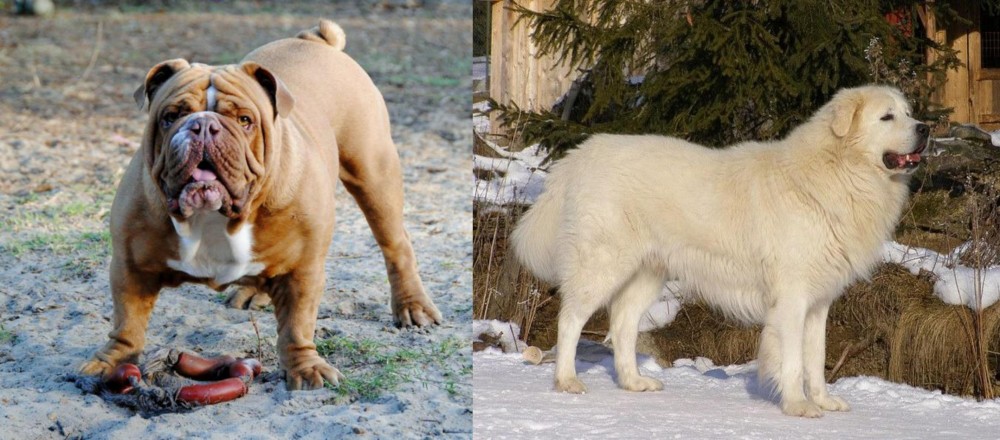 Australian Bulldog is originated from Australia but Slovak Cuvac is originated from Slovakia. Australian Bulldog may grow 20 cm / 7 inches shorter than Slovak Cuvac. Australian Bulldog may weigh 9 kg / 19 pounds lesser than Slovak Cuvac. Both Australian Bulldog and Slovak Cuvac has almost same life span. Both Australian Bulldog and Slovak Cuvac has same litter size. Both Australian Bulldog and Slovak Cuvac requires Moderate Maintenance.
Australian Bulldog is originated from Australia but Slovak Cuvac is originated from Slovakia. Australian Bulldog may grow 20 cm / 7 inches shorter than Slovak Cuvac. Australian Bulldog may weigh 9 kg / 19 pounds lesser than Slovak Cuvac. Both Australian Bulldog and Slovak Cuvac has almost same life span. Both Australian Bulldog and Slovak Cuvac has same litter size. Both Australian Bulldog and Slovak Cuvac requires Moderate Maintenance.
 The Australian Bulldog was bred from several breeds: The Bullmastiff, English bulldog, the English Staffordshire Bull Terrier and the Boxer. You will notice that his appearance is quite similar to the English bulldog, but this breed has a less-squished muzzle, fewer wrinkles and longer legs. They have great strength with a good thickness of the bone. They are solid and compact breed with good muscle tone.
The Australian Bulldog was bred from several breeds: The Bullmastiff, English bulldog, the English Staffordshire Bull Terrier and the Boxer. You will notice that his appearance is quite similar to the English bulldog, but this breed has a less-squished muzzle, fewer wrinkles and longer legs. They have great strength with a good thickness of the bone. They are solid and compact breed with good muscle tone.
The head structure of an Aussie Bulldog is one of its main attributes. It is very strong, square shaped with depth and width of muzzle less than a general bulldog. They have some wrinkle across the nose. Eyes are wide apart, large and clean. The jaw is wide and square, with strong teeth.
The name Australian Bulldog was given by Noel and Tina Green, the founders of the breed. They introduced Australian Bulldog to the public in 1998.
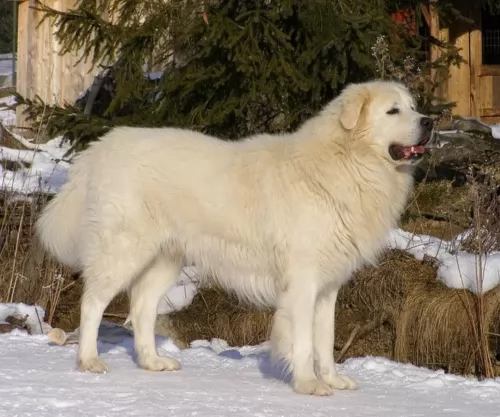 Looking quite a bit like the Pyrenean Mountain Dog, the Slovak Cuvac is a large dog that has served as a guard dog. The Slovensky Cuvac is still used on sheep farms as he isn’t afraid of wolves and bears and will take them on if needs be.
Looking quite a bit like the Pyrenean Mountain Dog, the Slovak Cuvac is a large dog that has served as a guard dog. The Slovensky Cuvac is still used on sheep farms as he isn’t afraid of wolves and bears and will take them on if needs be.
Records of this dog have been kept since the 17th century already, and when the breed started dying out, a certain Dr Antonin Hruza put in efforts to revive the dog.
The registered breeding of the Slovensky Cuvac was established in Czechoslovakia and a club for the dog was established in 1933. A written standard was established in 1964. The dog is not recognized by the Fédération Cynologique Internationale.
 Australian bulldogs can be very good companions considering their natural loyalty. They just love to interact with humans and they are rarely aggressive.
Australian bulldogs can be very good companions considering their natural loyalty. They just love to interact with humans and they are rarely aggressive.
They can be taught to be excellent watchdogs. The perfect place to raise this breed would be a house with a yard. The Australian Bulldog is usually dominant toward other dogs in its territory but, with proper training and early socialization, you can teach them to get along with other dogs and pets.
No matter if you are an active single, or you plan to bring an Australian bulldog puppy into the big family, as long as you are caring and loving toward him, he will be an amazing pet.
The Australian Bulldog is not recommended for apartment life. But, you can teach him to live in the smaller space if you tend to respect his daily need for activity. This breed is an indoor dog, and should not be left outside all day in a kennel. The best advice is to raise them in temperate climates since they can’t bear the extreme heat or extreme cold.
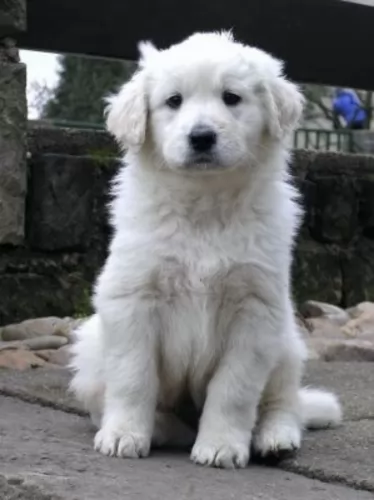 This is a large dog standing at between 59 and 70cm in height and weighing between 31 and 44kg.
This is a large dog standing at between 59 and 70cm in height and weighing between 31 and 44kg.
The neck is broad and has quite a bit of fur around it. The head is large, the eyes dark brown, the double coat is white and thick and medium length. The eyes are brown, the ears medium length and floppy and the tail long and furry.
This is a robust dog, used to spending time outdoors keeping watch over livestock. When he is invited into the home, he is gentle and well behaved, more so when he has been trained and socialized.
He is loving and loyal towards his human family and will get on well with children in the home. He isn’t the brightest dog but you can still have him trained.
 Australian Bulldog is a breed that will protect their family. They are great during the playtime with children as well. If you don’t have children, make sure you socialize your dog with children while he is still young.
Australian Bulldog is a breed that will protect their family. They are great during the playtime with children as well. If you don’t have children, make sure you socialize your dog with children while he is still young.
They are extremely intelligent. You can teach you Australian Bulldog almost everything in a very short time.
early socialization is a must with the Australian Bulldog.
you should start to train your Australian Bulldog as soon as possible. Positive reinforcement-based training methods are the ones you need to master in order to raise a good Australian Bulldog. They will be trained easily if there is a firm, consistent hand in training and they need leadership role from their owners. They can be taught very easy to be obedient and they love playing games like Frisbee, catch, water activities (but they swim very rarely because of their big and heavy chests), exploring the nature.
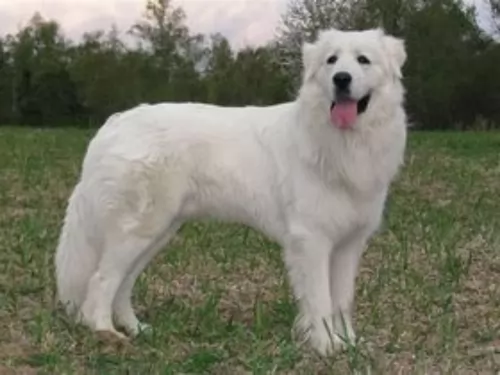 Your playful Slovak Cuvac is an affectionate dog, wanting nothing more than to be totally involved in his family’s life.
Your playful Slovak Cuvac is an affectionate dog, wanting nothing more than to be totally involved in his family’s life.
He is social and loving and also makes an excellent watchdog. He’s a big dog so think carefully before you bring him into your home. Many dog owners like the look of a big dog and forget that it costs a lot of money to feed a big dog and to pay for vet fees.
This big dog is wanting to be part of your family and not just to be discarded when you find that he is costing you too much.
 Australian Bulldog has better health than the English bulldog and its health continues to improve with each generation.
Australian Bulldog has better health than the English bulldog and its health continues to improve with each generation.
The pushed-in face causes harder breathing. Be aware that they can’t use the air to cool itself off as quickly as necessary. During the extreme heat, Australian Bulldogs can develop heat stroke and die from it.
Take special care of the wrinkles on their nose. They will require everyday care since wrinkles need to be cleaned and kept dry to prevent the skin infection. Bath the dog only when it is necessary because of too much bathing with soap damages the natural oils in its skin.
The Australian Bulldog, on average, is fed two times a day. They have the high risk of obesity, so there is no real need for more than two meals. Make sure to choose a premium quality food and to feed the dog according to the instructions. Also, they need lots of fresh water since they will be super active pet.
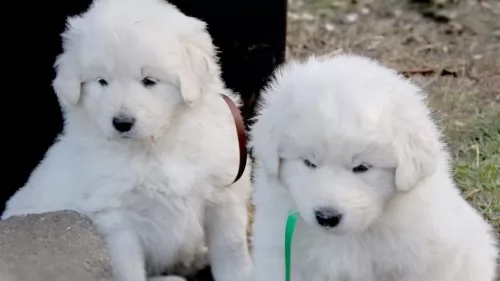 This is a healthy dog breed, but as with many large dogs, hip dysplasia is a threat. Hip dysplasia is always reason for concern as the condition can reduce a dog’s quality of life.
This is a healthy dog breed, but as with many large dogs, hip dysplasia is a threat. Hip dysplasia is always reason for concern as the condition can reduce a dog’s quality of life.
It is distressing seeing your once active pet becoming reluctant to play and move around.
Canine hip dysplasia is a common skeletal condition. It can strike any size dog but is more prevalent with large dogs. The ball and socket of the hip doesn’t fit properly and deterioration sets in resulting in loss of function of the joint.
You will need to get your dog to the vet who will perform a physical exam and discuss treatments to alleviate the pain your dog can experience.
 Feeding the puppy and adult: high-quality dog food for active dogs is a must. Do not overfeed them. If you are not sure about the amount of food your dog really needs, please consult a vet.
Feeding the puppy and adult: high-quality dog food for active dogs is a must. Do not overfeed them. If you are not sure about the amount of food your dog really needs, please consult a vet.
The Australian Bulldog needs minimal grooming. They should be brushed at least once a week using a firm bristled brush. They shed a moderate amount on a regular basis so there will be loose hair to deal with. Make sure to clip the nails when necessary. They will need a tooth brushing two times a week and checking and wiping its ears once a week.
Points for Good Health: every day long walks, plenty of exercises, special skin care and regular vet check-ups.
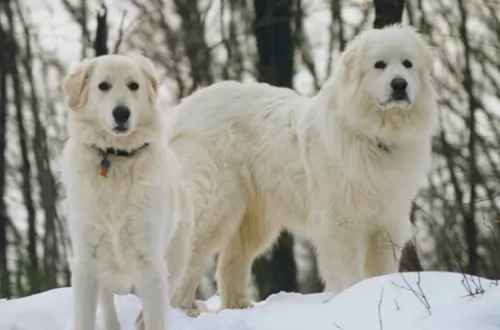 ◆The thick white hair will require regular grooming to keep it free from burrs and dirt. He sheds so this brushing will help him to look more groomed.
◆The thick white hair will require regular grooming to keep it free from burrs and dirt. He sheds so this brushing will help him to look more groomed.
◆The nails should be trimmed regularly and the ears too should be checked for redness and infection. You’ll need to look inside his mouth too as a rotting tooth can cause havoc within his body. A rotten tooth can also cause him tremendous pain and he has no way of telling you this.
◆Have your pet spayed or neutered if you don’t want any puppies. This is better for your dog’s health in the long run too.
◆Your Slovak Cuvac is going to need a lot of exercise as they have always been used to roaming the mountains watching over livestock.
◆This is a big dog so if you buy commercially manufactured food, make sure its for large, energetic dogs. There are good commercially manufactured dog foods on the market – just make sure you buy the best one for your pet to enhance health and longevity.
Try and give him some home made food too. Healthy food which won’t jeopardise his digestion is boiled chicken, brown rice or pasta and spinach, sweet potatoes and carrots. These can all be chopped up and small portions mixed into the dry kibble twice a week as a treat.
Try and include some raw meat occasionally. Your dog will thank you for not giving him exotic people foods which can do lots of harm. Ensure there is always a bowl of fresh, cool water within his reach.